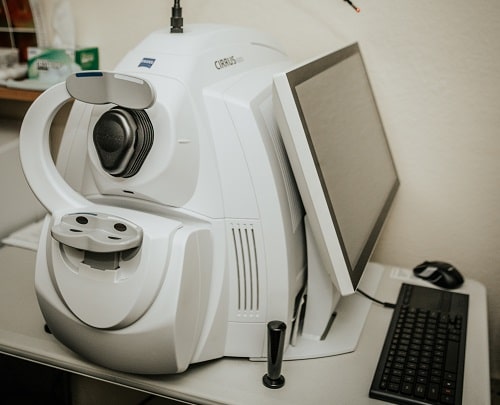Eyecare
We care about your eye health and your family as well
Macular Degeneration
What is Macular Degeneration?
Macular degeneration, often called age related macular degeneration or abbreviated as AMD, is a progressive disease of the central retina which can cause loss of central vision in one or both eyes. There are two main categories of macular degeneration: dry AMD and wet AMD.
The macula is a small region of the retina where the light sensing cells are most densely packed, allowing for the most precise vision. Over time, the metabolic waste products of these cells can build up and form deposits known as drusen. The formation of these drusen is the basis of dry macular degeneration. These drusen can begin to cause separation of the retina from its underlying blood supply. In some cases, the body responds by forming new blood vessels to attempt to feed the retina. These new blood vessels are weak and can break, leaking blood or fluid into the macula. This is wet macular degeneration.

Symptoms of macular degeneration can vary widely. If drusen are small or non-central, often there are no symptoms. As drusen involve the central macula (known as the fovea), vision can become wavy or distorted. If blood vessels form and leak, there can be a sudden change in central vision including gray/black spots, blurred vision, or wavy/distorted vision. Changes associated with dry AMD happen much more slowly than those from wet.
Screening for macular degeneration is primarily done clinically as part of a comprehensive dilated eye exam. Often drusen are seen in the macula on routine examination, prior to the development of any symptoms. A more detailed evaluation of the macula can be done using ocular coherence tomography (OCT) scanning which shows a detailed cross-sectional view of the layers of the retina. This can detect small changes and fluid early in disease progression.
Treatment of macular degeneration involves mitigating controllable risk factors such as smoking. Supplements are also recommended to improve the density of photopigments in the macula. Healthy diet with green leafy vegetables is shown to help with the density of these pigments as well. The consistent use of UV protection is suggested to prevent additional insult to the retinal cells.
If progression to wet macular degeneration occurs and fluid is detected on OCT, a referral may be made to treat with a series of intravitreal injections. Medications which “dry up” this fluid and reverse abnormal blood vessel growth are injected into the eye by a retina specialist. Currently, a similar treatment is in trials for advanced dry macular degeneration but to date there is not an acute treatment for the dry form of the disease.
Depending on the stage and form of macular degeneration, follow up care will vary from annual exams to monthly follow up to monitor for progression requiring referral and treatment. The newest technology in OCT now helps detect new blood vessel growth in the macula without invasive imaging techniques.
Contact Us to schedule your appointment
Call us on (406) 535-2020 or complete the inquiry form to schedule your appointment or to learn more about how we help our patients.


 Call us at
Call us at